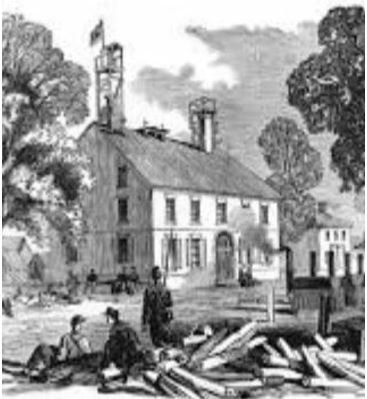George Thorpe
“America’s First Whiskey Man”
(1575–1622)
George Thorpe was a notable English landowner, educator, distiller, and early investor in American colonial enterprises. He is best remembered for his ambitious efforts to establish a college aimed at educating and Christianizing Native American children in Virginia. Hired by the London Company in April 1620, Thorpe was tasked with managing 11,000 acres of land along the James River, where agricultural activities were meant to support the school. Unfortunately, his efforts were cut short when he was killed in a Native American attack during the Anglo-Powhatan War on March 22, 1622, a violent event that claimed the lives of 347 colonists.
Born into a wealthy family in Gloucestershire, England in 1575, Thorpe received an education in law and held various public roles, including serving as a Member of Parliament in what was known as “The Addled Parliament.” He was married twice, first to Margaret Porter and then to Margaret Harris, with whom he had five children. Despite his success in England, Thorpe felt a calling to the New World, motivated by a strong religious conviction and a desire to improve relations with Indigenous peoples.
Upon his arrival in Virginia, Thorpe quickly earned recognition and was appointed co-leader of the Berkeley Plantation, a settlement established in 1619. He also became involved in plans for a college intended to provide education to both English settlers and Native Americans, reflecting the strong religious zeal of the time. His commitment to fostering positive relationships with Indigenous populations was evident in his efforts to convert them to Christianity and educate their children.
Thorpe's agricultural pursuits included experiments with distilling. Notably, he adapted traditional European distillation methods to use corn—introduced by Native Americans—rather than barley. By the fall of 1620, he had successfully produced what is believed to be the first corn whiskey in North America, a precursor to modern bourbon. In a letter dated December 19, 1620, he boasted about his corn-based drink, indicating that it often surpassed the quality of English beer.
Despite his early successes, Thorpe's aspirations faced challenges. He encountered resistance from Indigenous leaders, particularly Opechancanough, a chief who opposed English encroachment on Native lands. Thorpe's efforts to establish a school for Indigenous children may have heightened tensions. On the fateful night of March 22, 1622, a coordinated attack by Native Americans led to widespread destruction and loss of life, including Thorpe's. His death, described as particularly brutal, marked a tragic end to his vision for coexistence.
Thorpe’s legacy extends beyond his distillation efforts; he represents the complexities of early colonial life, marked by both cooperation and conflict with Native Americans. While he is often overshadowed by figures like George Washington in the history of American distilling, Thorpe’s contributions to the industry are significant. His production of corn whiskey and the introduction of innovative practices in agriculture laid the groundwork for future distillers.
Ultimately, George Thorpe’s life reflects the aspirations and challenges of early colonial America. His commitment to education, agriculture, and fostering goodwill with Indigenous peoples encapsulates the broader themes of hope, conflict, and tragedy that defined this era of American history.
Contributed by: Jay Etris, Elkton, Maryland
with support from Bill & Vicki Gallagher, Mid-Atlantic Rye Whiskey Section Editors, Marriottsville, Maryland



